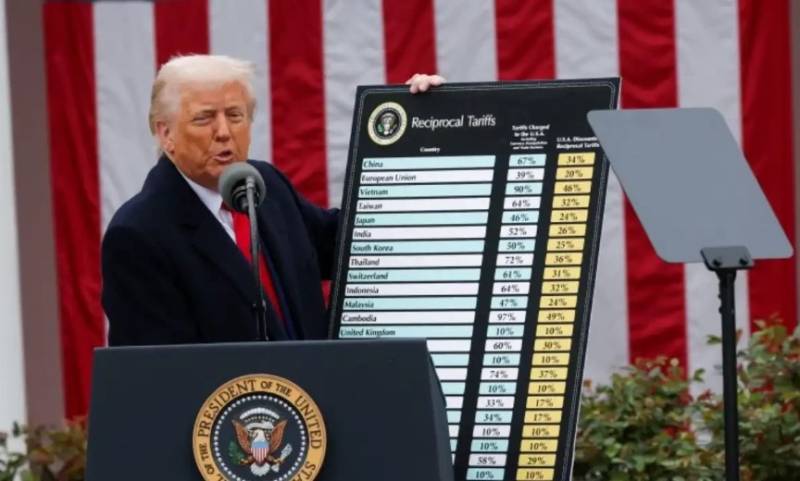ISLAMABAD, April 08: Amid rising tensions over reciprocal US tariffs, Pakistan’s private sector sees the move by the Trump administration as a strategic push aimed at compelling Islamabad into negotiations over greater American access to Pakistani markets.
While the tariffs also target other key textile-exporting nations like India, Vietnam, and Bangladesh, both New Delhi and Hanoi have already taken pre-emptive measures.
Bangladesh, which maintains the lowest tariff rates on US goods, has requested a three-month grace period, while Vietnam has put forth a zero-duty offer on American products.
These moves are seen as calculated steps to remain in Washington’s good books.
However, Pakistan’s commerce ministry is still at the early discussion stage, drawing concern from industry stakeholders.
Commerce Minister Jam Kamal chaired a meeting with leading textile exporters on Monday to discuss Pakistan’s strategic response.
He noted that the country’s trade officers and ambassador in Washington are actively engaging with US authorities to ensure Pakistan’s concerns are being communicated.
Despite this assurance, exporters present at the meeting expressed dissatisfaction, highlighting the ministry’s lack of preparedness in handling the post-tariff scenario.
One participant noted that the discussion was largely superficial, with no concrete roadmap shared by officials.
In contrast, the ministry portrayed the meeting as a proactive step towards crafting an informed response to the US measures.
Analysis and Policy Suggestions
The Policy Research and Advisory Council (PRAC) of the Karachi Chamber of Commerce and Industry conducted a detailed study assessing the impact of the new US tariffs on Pakistani exports, particularly textiles.
This marks the first significant attempt to quantify the effects, as the commerce ministry has yet to release any official analysis.
PRAC Chairman Younus Dagha stressed the urgency of finalizing Pakistan’s response.
He called for reciprocal tariff relief on critical US exports such as soybeans, cotton, and machinery, recommending that Pakistan extend zero-duty concessions to the US on par with those offered to China and GCC nations under existing trade agreements.
Dagha argued that this is the only path toward securing preferential treatment for Pakistani textile goods in the US market.
He also suggested that Islamabad actively engage with US trade authorities to renegotiate tariff structures, vital for retaining market share.
Textile products make up 77% of Pakistan’s total exports to the US, amounting to $4.18 billion, making them the country’s most crucial export category to that market.
In contrast, Pakistan’s imports from the US are more diversified, comprising textiles (38%), base metals (22%), machinery (9%), chemicals (6%), and transport equipment (5%).
Strengthening Bilateral Trade Ties
Khurram Mukhtar, Patron-in-Chief of the Pakistan Textile Exporters Association, suggested that while the tariffs may appear threatening, the move seems strategic rather than permanent.
He expressed confidence that Pakistan will retain a competitive edge over its rivals, citing its vertically integrated supply chain, strict adherence to quality standards, and strong trade partnerships.
Mukhtar also highlighted Pakistan’s role as a major importer of US cotton, which supports American agriculture and strengthens bilateral trade.
He urged the US to recognize this longstanding cooperation and adopt balanced trade policies that don’t unfairly penalize Pakistani exports.
He recommended that Pakistan prioritize imports of essential US goods such as cotton, soybeans, petroleum, and scrap metal. Reducing tariffs on these could provide leverage in advocating for reciprocal preferential access for Pakistani products.
Expert Opinions and Strategic Outlook
Speaking at a seminar hosted by the Sustainable Development Policy Institute (SDPI), Dr. Manzoor Ahmed, Pakistan’s former ambassador to the World Trade Organization, called for an overhaul of the country’s trade strategy.
“The global trade climate demands bold policy recalibrations. We must focus on securing free and preferential trade agreements, especially with the US,” he said.
Dr. Ahmed pointed out that Pakistan’s exports constitute only 10% of GDP, in sharp contrast to Vietnam, where exports account for nearly 100%, underscoring the need for deep structural reforms.
M. Hassan Shafqaat, CEO of the Pakistan Textile Council, encouraged the government to treat the current situation as both a near-term challenge and a long-term opportunity, especially as China faces more substantial consequences from the tariffs.
Meanwhile, Samir S. Amir from the Pakistan Business Council flagged operational inefficiencies in local manufacturing, such as high yarn wastage in towel production and low per-unit revenue in apparel exports.
He advocated for a shift away from broad subsidies towards targeted sectoral reforms, urging policymakers to pivot the narrative from “trade risks” to “regional trade potential,” especially within South and Southeast Asia.
